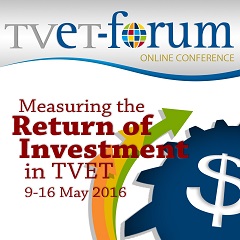
The UNESCO-UNEVOC International Centre: Who We Are | What We Do | Working With Us | Get in Touch
The UNEVOC Network: Learn About the Network | UNEVOC Network Directory
For Members: UNEVOC Centre Dashboard
Thematic Areas: Inclusion and Youth | Digital Transformation | Private Sector Engagement | SDGs and Greening TVET
Our Key Programmes & Projects: BILT: Bridging Innovation and Learning in TVET | Building TVET resilience | TVET Leadership Programme | WYSD: World Youth Skills Day
Past Activities: COVID-19 response | i-hubs project | TVET Global Forums | Virtual Conferences | YEM Knowledge Portal
Our Services & Resources: Publications | TVET Forum | TVET Country Profiles | TVETipedia Glossary | Innovative and Promising Practices | Toolkits for TVET Providers | Entrepreneurial Learning Guide
Events: Major TVET Events | UNEVOC Network News

Introduction | Messages | Participants | Sign Up
 In the next edition of UNESCO-UNEVOC’s virtual conferences, we would like to discuss with you Return on Investment (ROI) in technical and vocational education and training (TVET). The conference will take place from 9 to 16 May 2016 on the UNESCO-UNEVOC TVeT Forum.
In the next edition of UNESCO-UNEVOC’s virtual conferences, we would like to discuss with you Return on Investment (ROI) in technical and vocational education and training (TVET). The conference will take place from 9 to 16 May 2016 on the UNESCO-UNEVOC TVeT Forum.
Background
The 2030 Agenda for Sustainable Development calls on Members States to “ensure inclusive and equitable quality education and promote lifelong learning opportunities for all” and sets a number of targets related to technical and vocational education and training (TVET), including to, by 2030, “substantially increase the number of youth and adults who have relevant skills, including technical and vocational skills, for employment, decent jobs and entrepreneurship”. The vision is holistic and the commitment to ‘leave no one behind’ puts the onus on all Member States to contribute.
While such a transformative vision reasserts the importance of the education sector, of which TVET is an integral component, to contribute towards the transition towards equitable, inclusive and sustainable societies and economies, it also gives rise to a number of challenges. One important challenge is related to the financing of TVET.
While the current international policy developments put more stress on financing structures, issues surrounding funding in TVET are not purely monetary. The recent international attention to the importance of education might encourage governments and other stakeholders to explore the Return on Investment (ROI) from investing in TVET, and understand the different types of benefits individuals, enterprises and governments obtain from investing in training. It is therefore important for TVET stakeholders to be able to measure, document and explain the ROI in TVET to convince other stakeholders to invest.
Virtual conference
This virtual conference focuses on ROI in TVET and seeks to inform the wider TVET community about a current research project currently undertaken by the National Centre for Vocational Education Research (NCVER) in Australia. Importantly, it is an opportunity for the community to share their ideas, expertise and experiences with the research team to strengthen and validate the initial bases for measuring ROI and identifying indicators.
About the moderator
The virtual conference will be moderated by Mr Phil Loveder and Mr John Stanwick from the National Centre for Vocational Education Research (NCVER) in Australia. The NCVER has been a UNEVOC Centre since 2000 and is currently the Cluster Coordinator for the Pacific Islands Cluster.
 Mr Phil Loveder has almost thirty years’ experience in educational research and business development in both the higher education and TVET sectors. He has a particular interest in researching industry models of education and in the funding and financing of training. Philip is currently the regional co-coordinator of the Pacific Island sub-cluster in the Asia-Pacific UNEVOC Network region.
Mr Phil Loveder has almost thirty years’ experience in educational research and business development in both the higher education and TVET sectors. He has a particular interest in researching industry models of education and in the funding and financing of training. Philip is currently the regional co-coordinator of the Pacific Island sub-cluster in the Asia-Pacific UNEVOC Network region.
 Mr John Stanwick has many years’ experience in social science research at NCVER and also the former Australasian Centre for Policing Research. His research interests include the financing of vocational education and training, youth transitions, disengaged youth, structural change in industry and its relevance to vocational education and training, and the impact of social science research.
Mr John Stanwick has many years’ experience in social science research at NCVER and also the former Australasian Centre for Policing Research. His research interests include the financing of vocational education and training, youth transitions, disengaged youth, structural change in industry and its relevance to vocational education and training, and the impact of social science research.